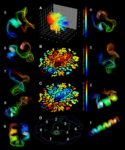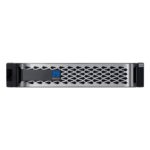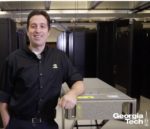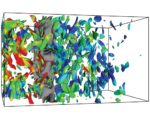Communications of the ACM

The blog archive provides access to past blog postings from Communications of the ACM and other sources by date.
August 2019
From insideHPC
IBM Opens POWER Instruction Set Architecture

 This week at The Linux Foundation Open Source Summit, IBM announced it is opening the POWER Instruction Set Architecture (ISA). "The opening of the Power ISA, an architecture with a long and distinguished history, will help
…
This week at The Linux Foundation Open Source Summit, IBM announced it is opening the POWER Instruction Set Architecture (ISA). "The opening of the Power ISA, an architecture with a long and distinguished history, will help
…
From The Eponymous Pickle
GeoThermal Batteries

Never hear of this specifically, but makes sense.
A Novel Thermal Battery Promises Green Power Around the Clock
Japanese scientists have developed a thermal battery that converts heat into electricity when buried in a geothermal…
From The Eponymous Pickle
Epistemic (How we gain secure and manage) Knowledge

Also fundamental. Really how we manage knowledge, which means lots of things including finding, keeping and preparing it for use in context. I would add fear and measurable risk too. Who would imagine we could fear data…
From insideHPC
Exascale CANDLE Project to Fight Against Cancer

 The CANcer Distributed Learning Environment, or CANDLE, is a cross-cutting initiative of the Joint Design of Advanced Computing Solutions for Cancer collaboration and is supported by DOE’s Exascale Computing Project (ECP). CANDLE…
The CANcer Distributed Learning Environment, or CANDLE, is a cross-cutting initiative of the Joint Design of Advanced Computing Solutions for Cancer collaboration and is supported by DOE’s Exascale Computing Project (ECP). CANDLE…
From The Eponymous Pickle
Understand Variance

Yes, variance fundamental, a primary indication of context and causal influences.
Do You Understand the Variance In Your Data?
Thomas C. Redman in HBR
It is easy enough for managers to see that things in the business world vary.…
From insideHPC
Podcast: AMD is Back to Glory Days wit Rome CPU

 http://radiofreehpc.com/audio/RF-HPC_Episodes/Episode240/RFHPC240_AMD-7nm-Rome.mp3 In this podcast, the Radio Free HPC team looks into the AMD Rome CPU, a beast that brings back the glory days of Opteron and establishes itself…
http://radiofreehpc.com/audio/RF-HPC_Episodes/Episode240/RFHPC240_AMD-7nm-Rome.mp3 In this podcast, the Radio Free HPC team looks into the AMD Rome CPU, a beast that brings back the glory days of Opteron and establishes itself…
From insideHPC
Frontera: The Next Generation NSF HPC Resource, and Why HPC Still isn’t the Cloud

 Dan Stanzione from TACC gave this talk at the MVAPICH User Group. "In this talk, I will describe the main components of the award: the Phase 1 system, “Frontera”, the plans for facility operations and scientific support for the…
Dan Stanzione from TACC gave this talk at the MVAPICH User Group. "In this talk, I will describe the main components of the award: the Phase 1 system, “Frontera”, the plans for facility operations and scientific support for the…
From The Computing Community Consortium Blog
Deep Neural Network Acceleration Beyond Chips

The following blog was written by Computing Community Consortium (CCC) Chair Mark D. Hill from the University of Wisconsin Madison. This week Cerebras announced a bold design to accelerate deep neural networks with silicon that…
From The Eponymous Pickle
Intel AI Chip

Have always been interested in what can be done with AI oriented Hardware. Now Intel has a solution:
Intel unveils first artificial intelligence chip Springhill
JERUSALEM (Reuters) - Intel Corp on Tuesday unveiled its latest processor…
From The Eponymous Pickle
Customer Experience and AI

On upcoming talk on CX via personalized customer experience using AI:
Buying experience and customer service “changing through AI” – SAP
Liliana Petrova - in CustomerThink
How can companies create personal, one-on-one long-lasting…
From The Eponymous Pickle
US Air Force Prints Aircraft Parts

Continued increase in use of 3D printing
Air Force certifies first 3-D printed nonstructural aircraft parts
by Louis Briscese, Air Force Office of Scientific Research in Techexplore
The 60th Maintenance Squadron is the first field…
From Schneier on Security
Google Finds 20-Year-Old Microsoft Windows Vulnerability

There's no indication that this vulnerability was ever used in the wild, but the code it was discovered in -- Microsoft's Text Services Framework -- has been around since Windows XP....
From The Eponymous Pickle
Model Driven Software Development

Brought to my attention. I like the idea, as long as it does not remove transparency, especially as it relates to real-life process and context. This is about software, with its inherent sometimes mysterious complexity, and…
From The Eponymous Pickle
Autonomous Robot Delivery in US Universities

Makes sense to try this in the demographic and relatively contained space of a University. Autonomous robot deliveries are coming to 100 university campuses in the U.S. By Luke Dormehl in DigitalTrends
Pioneering autonomous…
From insideHPC
NetApp EF600 Storage Array Speeds HPC and Analytics

 Today NetApp announced the NetApp EF600 storage array. The EF600 is an end-to-end NVMe midrange array that accelerates access to data and empowers companies to rapidly develop new insights for performance-sensitive workloads.…
Today NetApp announced the NetApp EF600 storage array. The EF600 is an end-to-end NVMe midrange array that accelerates access to data and empowers companies to rapidly develop new insights for performance-sensitive workloads.…
From Gödel's Lost Letter and P=NP
Our Trip To Monte Carlo
Why does randomness help? Kathryn Farley is my dear wife. She and I are currently on a cruise through the Mediterranean. Our trip started in Barcelona and is stopping daily at various cities as we journey to Rome. “Tough duty…
From insideHPC
ANSYS Cloud HPC Increases Simulation throughput for Hundreds of Organizations

 Engineers are unlocking increased compute capacity to achieve advancements in 5G, autonomous systems, electric vehicles, and other global megatrends thanks to ANSYS Cloud HPC, powered by Microsoft Azure. Available from directly…
Engineers are unlocking increased compute capacity to achieve advancements in 5G, autonomous systems, electric vehicles, and other global megatrends thanks to ANSYS Cloud HPC, powered by Microsoft Azure. Available from directly…
From insideHPC
Intel Talks at Hot Chips gear up for “AI Everywhere”

 Today at Hot Chips 2019, Intel revealed new details of upcoming high-performance AI accelerators: Intel Nervana neural network processors, with the NNP-T for training and the NNP-I for inference. Intel engineers also presented…
Today at Hot Chips 2019, Intel revealed new details of upcoming high-performance AI accelerators: Intel Nervana neural network processors, with the NNP-T for training and the NNP-I for inference. Intel engineers also presented…
From insideHPC
Singularity Enterprise to Accelerate Adoption of Containers with Cryptographically Verifiable Trust

 Today Sylabs announced that Singularity Enterprise is now generally available as a self-hosted offering, making it faster and easier for businesses to adopt containerization across their production environments. In private beta…
Today Sylabs announced that Singularity Enterprise is now generally available as a self-hosted offering, making it faster and easier for businesses to adopt containerization across their production environments. In private beta…
From insideHPC
OpenHPC: Community Building Blocks for HPC Systems

 Karl Schultz from the Oden Institute gave this talk at HPCKP'19. "Formed initially in November 2015 and formalized as a Linux Foundation project in June 2016, OpenHPC has been adding new software components and now supports multiple…
Karl Schultz from the Oden Institute gave this talk at HPCKP'19. "Formed initially in November 2015 and formalized as a Linux Foundation project in June 2016, OpenHPC has been adding new software components and now supports multiple…
From The Eponymous Pickle
Risk Aware Traffic Engineering

Analysis and use risk measures a favorite approach of mine. Risk-aware always a good idea. Especially considering architectures.
Using Wall Street secrets to reduce the cost of cloud infrastructure
“Risk-aware” traffic engineering…
From Schneier on Security
Surveillance as a Condition for Humanitarian Aid

Excellent op-ed on the growing trend to tie humanitarian aid to surveillance. Despite the best intentions, the decision to deploy technology like biometrics is built on a number of unproven assumptions, such as, technology solutions…
From The Eponymous Pickle
What Your Voice Reveals

And of course you may be revealing things you want to keep private. As this kind of pattern recognition advances we will see more of that.
What Your Voice Reveals About You
The Wall Street Journal
By Sarah Krouse
Technology can…
From The Eponymous Pickle
Digital Twins Grow Up

"Digital Twins Grow Up," by Samuel @samthewriter Greengard, says that digital twins, or exact #virtual representations of physical objects and #systems, are revolutionizing #engineering, #manufacturing, and other fields.
Digital…
From The Eponymous Pickle
Magnetic Precise Drug Delivery

Seems a very good advance. Do we know the exact implications of precise delivery of pharma? Practical issues?
A new way to deliver drugs with pinpoint targeting
Magnetic particles allow drugs to be released at precise times and…
From insideHPC
Cerebras Systems Unveils the Industry’s First Trillion Transistor Chip for AI

 Today AI startup Cerebras Systems unveiled the largest chip ever built. "The Cerebras Wafer-Scale Engine (WSE) is the largest chip ever built. 56x larger than any other chip, the WSE delivers more compute, more memory, and more…
Today AI startup Cerebras Systems unveiled the largest chip ever built. "The Cerebras Wafer-Scale Engine (WSE) is the largest chip ever built. 56x larger than any other chip, the WSE delivers more compute, more memory, and more…
From insideHPC
UPMEM Puts CPUs Inside Memory to Allow Apps to Run 20 Times Faster

 Today UPMEM announced a Processing-in-Memory (PIM) acceleration solution that allows big data and AI applications to run 20 times faster and with 10 times less energy. Instead of moving massive amounts of data to CPUs, the silicon…
Today UPMEM announced a Processing-in-Memory (PIM) acceleration solution that allows big data and AI applications to run 20 times faster and with 10 times less energy. Instead of moving massive amounts of data to CPUs, the silicon…
From insideHPC
Video: Unboxing the NVIDIA DGX-1 Supercomputer at Georgia Tech

 In this video, Oded Green from NVIDIA unboxes a DGX-1 supercomputer at the College of Computing Data Center at Georgia Tech. "And while the DGX-1 arriving at Georgia Tech for student-use is exciting enough, there is cause for…
In this video, Oded Green from NVIDIA unboxes a DGX-1 supercomputer at the College of Computing Data Center at Georgia Tech. "And while the DGX-1 arriving at Georgia Tech for student-use is exciting enough, there is cause for…
From BLOG@CACM
The Autocracy of Autonomous Systems

We, as developers of such systems, need to take some conscious decisions to make sure we do not usher in the age of autocracy of autonomous systems.
From insideHPC
Simulating Shock Turbulence Interactions on Stampede II

 In this special guest feature, Jorge Salazar from TACC writes that Researchers are using XSEDE supercomputers to better understand shock turbulence interactions. "We proposed that, instead of treating the shock as a discontinuity…
In this special guest feature, Jorge Salazar from TACC writes that Researchers are using XSEDE supercomputers to better understand shock turbulence interactions. "We proposed that, instead of treating the shock as a discontinuity…
